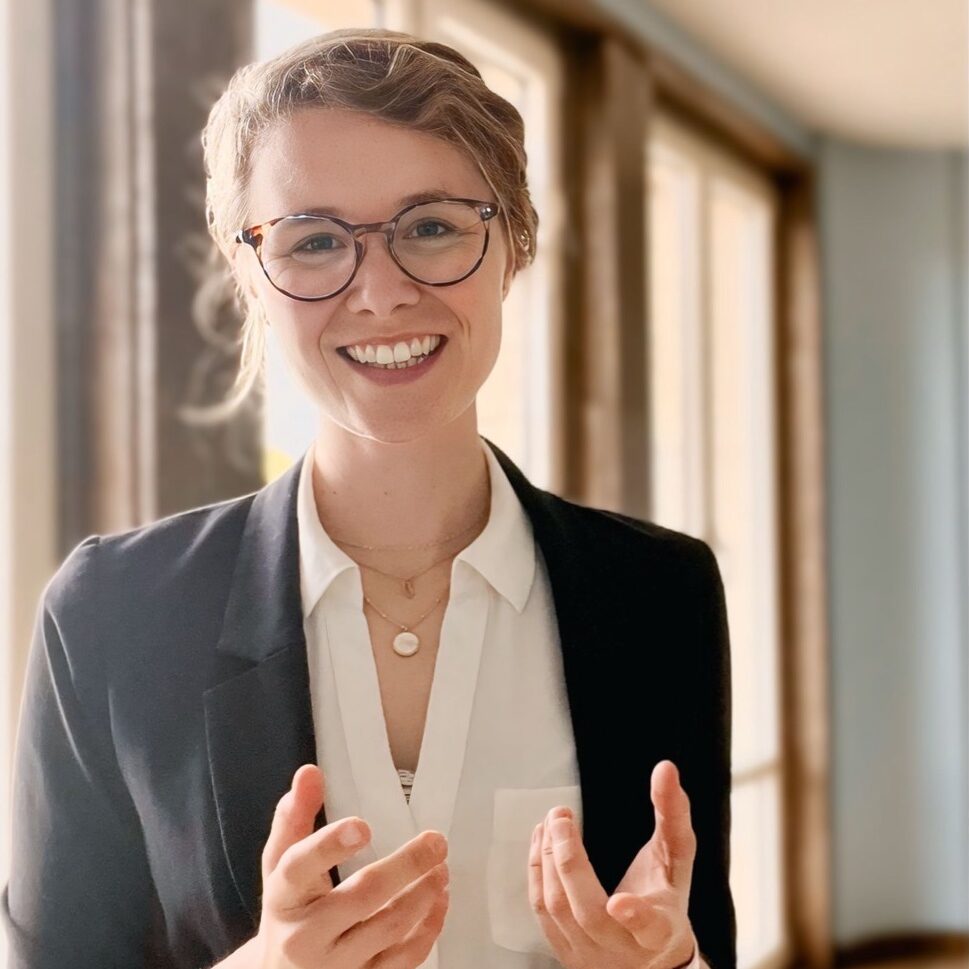Our team approaches psychological reactance from different perspectives: the research area of cross-cutting exposure, interpersonal communication and emotion psychology. This diverse background inspires us to rethink the theory from different angles – we are looking forward to getting to know yours! Feel free to reach out to any of us.
Dr. Lara Kobilke

Lara holds a double BA in Communication Sciences, German Literature, and Law, as well as a Master’s in Communication Science from LMU Munich. Her Master’s thesis, which investigated the dissemination of the term “Lying press” from the PEGIDA movement to mainstream media—a focal point in contemporary media discourse between 2015 and 2017—earned her the department’s Best Thesis Award.
She completed her PhD at the University of Zurich (UZH) in 2022, where her research centered on the dynamics of cross-cutting exposure and political participation—how individuals react to being exposed to differing political viewpoints. This research ultimately led her to specialize in reactance theory, which explores how people resist persuasive communication, especially in polarized environments. This work contributes significantly to understanding how communication fails or succeeds in contentious public spheres.
As the coordinator for the R-Curriculum and Statistics Help Desk at LMU Munich, Lara plays her part in advancing research methodologies in communication studies. She co-developed the R package tidycomm with Julian Unkel and Mario Haim—a tool designed to standardize computational communication research and make advanced methods more accessible to both students and researchers. Beyond her institutional responsibilities, Lara is committed to educating future scholars by teaching R at LMU and through her open-access tutorials, which are available to researchers worldwide. Her resources empower educators and researchers with the skills needed to effectively teach and apply R for data analysis (e.g., her teach-the-teachers course). Her institutional tutorial website guides students through statistics and R, ensuring they gain a solid foundation for their future research.
In her current research, Lara integrates data analysis and computational communication methods to better understand resistance dynamics in wicked problems—complex societal challenges with contradictory solutions. Her work is particularly focused on issues that evolve in digital contexts, such as social media platforms, where polarization and resistance to persuasion are prevalent. www.larakobilke.de | Mail
Katharina Hajek is in the final phase of her Ph.D. at the University of the Arts Berlin, focusing on the psychological dynamics of resistance in digitally negotiated polycrises. Her research includes a year-long stay at the University of California, Berkeley, with the „Algorithms of Culture“ group and the Dacher Keltner Lab. Concurrently, she researches at LMU Munich on measuring reactance in written communication, particularly in social media comments. She also engages in podcasting and blogging to connect her research with current societal developments.
Katharina’s academic journey is characterized by a blend of theory and practice. She studied Communication Science and Political Science at the University of Erfurt, where she wrote her Bachelor’s thesis on parasocial relationships, and later pursued her Master’s at the University of the Arts Berlin, focusing on digital resistance dynamics. Alongside her studies, she worked in practical communication (radio, print, internal communication), gaining essential insights.
After six years in a managerial role outside academia, Katharina returned to research, driven by the role of freedom-related resistance in digital spaces like Facebook, Instagram, and Telegram.
Katharina Hajek, M.A.
Since 2019, she has been engaged again in academic research, initially through a scholarship (sdw) and later in research and teaching roles. She also served as scientific director for nearly three years at a start-up combining data science with emotion psychology. Currently she works at the LMU as a lecturer for the Master Class in Communication Sciences about the psychology of resistance in theory and practice.

Katharina is deeply involved in volunteer work: she founded Berlin’s largest choir (Unity), launched a news website for people with anxiety (angstfrei.news), served on the board of the women’s empowerment group „sdWomen,“ and is an enthusiastic choir singer. She also represented early-career researchers in the DGPuK’s Political Communication Division (Napoko) for two years. Katharina’s interdisciplinary work spans psychology, communication science, and the digital realm. She believes researchers have a responsibility to foster awareness of the power, potential, and limits of digital communication in shaping reality today. www.katharina-hajek.de | Mail
(Image made by Ideogram.ai)
